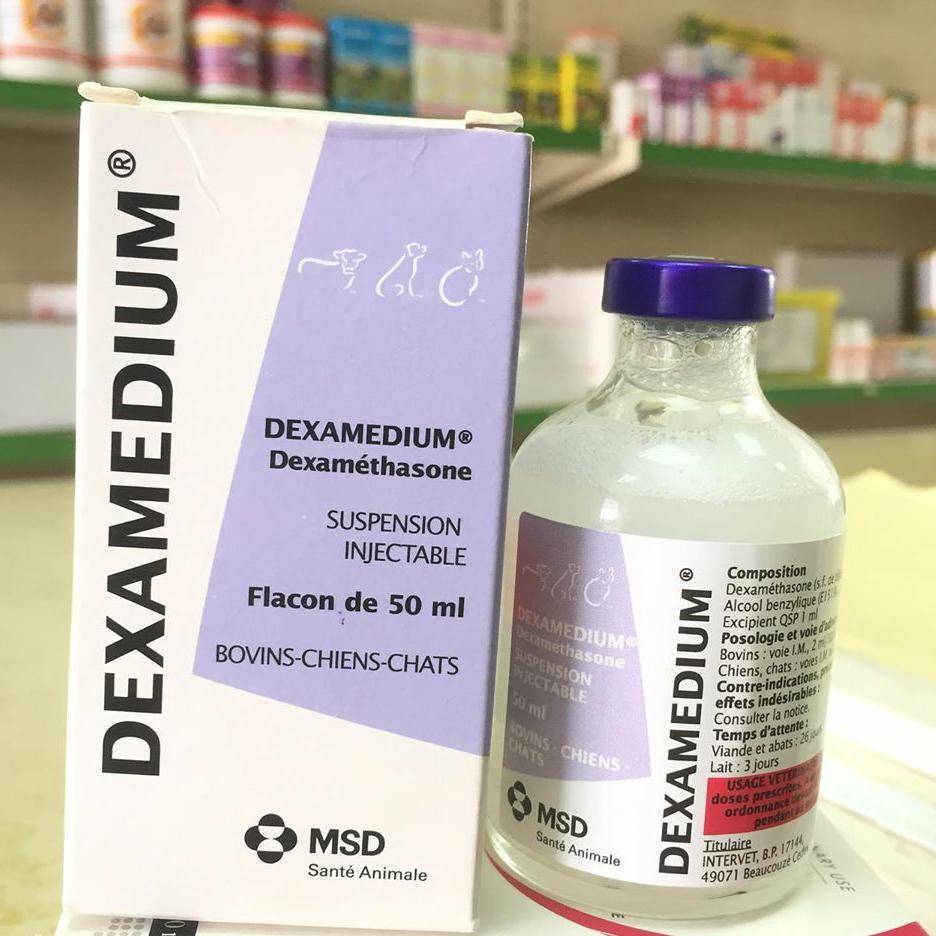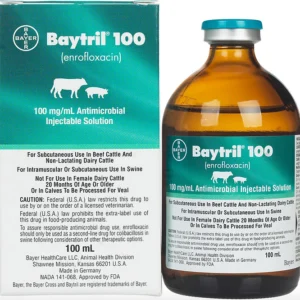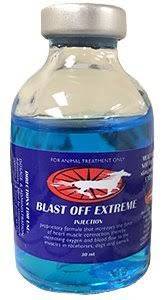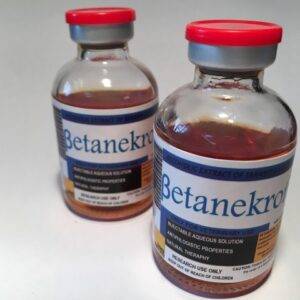Dexamedium
Dexamedium 50ml is a potent synthetic glucocorticoid with low mineralocorticoid activity. It has 10 to 20 times the anti-inflammatory activity of prednisolone equivalent molar dose.
What is Dexamethasone?
Dexamedium is a synthetic corticosteroid used to treat inflammation and immune-mediated conditions.
It has potent anti-inflammatory and immunosuppressive properties.
It’s available in various formulations, including injectable solutions, tablets, and topical forms.
Uses in Veterinary Medicine (Especially for Horses)
Allergic reactions: Often used to manage acute allergic reactions, including anaphylaxis and hives.
Respiratory conditions: Helpful in treating inflammatory airway diseases, such as chronic obstructive pulmonary disease (COPD) or heaves in horses.
Arthritis and musculoskeletal inflammation: Reduces inflammation in joints and soft tissues.
Autoimmune diseases: Used to suppress the immune system in conditions like autoimmune hemolytic anemia.
Shock and trauma: Used in certain shock conditions to stabilize the horse’s system.
Central nervous system injury: Sometimes prescribed for spinal or brain injuries to control inflammation.
Dosage and Administration
Dexamedium is often administered orally, intramuscularly, or intravenously.
Dosages vary depending on the condition being treated, the severity, and the horse’s size and overall health. Always follow a veterinarian’s recommendation for precise dosage. Dexamedium
Common Side Effects
Laminitis: One of the most significant risks in horses. Laminitis is a painful and potentially debilitating condition affecting the hooves. Horses treated with corticosteroids, especially in high doses, are at increased risk.
Increased thirst and urination: This is a common side effect in animals on corticosteroids.
Suppressed immune system: Long-term use may lead to increased susceptibility to infections.
Muscle loss: Prolonged use can cause muscle atrophy or weakness.
Behavioral changes: Some horses might become more excitable or restless.
Precautions
Laminitis risk: As mentioned, horses prone to laminitis or with a history of this condition should be monitored carefully.
Long-term use: Chronic use can lead to serious side effects like immune suppression, muscle wasting, or adrenal insufficiency.
Diabetic horses: It should be used cautiously in diabetic horses, as corticosteroids can increase blood glucose levels.
We do offer a wide range of products and below, you shall find just a sample list of what we have in stock : Dexamedium 50ml
Pharmacodynamic properties:
Dexamedium 50ml is a potent synthetic glucocorticoid with low mineralocorticoid activity. It has 10 to 20 times the anti-inflammatory activity of prednisolone equivalent molar dose. Dexamedium
Corticosteroids can decrease the immune response. Indeed, they inhibit capillary dilatation, leukocyte migration and phagocytosis.
Glucocorticoids have an effect on metabolism by increasing gluconeogenesis.
Pharmacokinetic properties:
After IM administration of the product: dexamethasone tebutate is absorbed relatively slowly, prolonging the duration of action of dexamethasone for 3 to 4 days. The T max in cattle and dogs respectively 28 and 22 h after administration. T 1/2 (half-life time) varies between 61 hours in cattle and 50 hours in dogs. Bioavailability of about 100%.
Withdrawal Times for Performance Horses
In competitive horses, corticosteroids like dexamethasone have withdrawal periods before competitions to comply with anti-doping regulations. The specific withdrawal time can depend on the form and dosage used, but it’s typically recommended to discontinue its use several days to weeks before competition. Always check with regulatory bodies or the overseeing veterinarian for guidelines.
Alternatives to Dexamethasone
Depending on the condition, other anti-inflammatory medications like NSAIDs (e.g., phenylbutazone or flunixin meglumine) may be recommended as alternatives, particularly if laminitis risk is a concern.
Veterinary Supervision
Dexamethasone should only be used under the supervision of a veterinarian due to its powerful effects and potential risks.
Special precautions for use:
Shake the bottle well before use.
The administration of corticosteroids at the end of gestation can lead to premature delivery or abortion in ruminants.
Except in the indications for acetonemia, the function of corticosteroids is to provide improvement rather than cure. It is therefore advisable to diagnose and treat the underlying disease.
When used to treat shock, intravenous fluids must be administered to maintain circulation. An acid-base balance must be carried out.
Precautions for pregnancy and lactation:
Studies in laboratory animals have shown embryotoxic effects.
The use of corticosteroids in pregnant animals is not recommended.
Interactions:
Since corticosteroids may reduce the immune response to vaccination, dexamethasone should not be administered concurrently with vaccines.
Concomitant administration of NSAIDs may increase the risk of ulceration of the gastrointestinal tract.
Special precautions for users:
In case of accidental self-injection, seek medical advice immediately and show the package leaflet.
People with known hypersensitivity to the active substance or to any of the excipients should avoid contact with the veterinary medicinal product.
Pregnant women should not handle this medicine. Dexamedium





Reviews
There are no reviews yet.